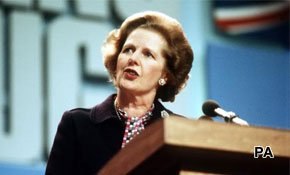YouGov President, Peter Kellner, latest commentary - Thatcher: time to move on
As I returned from the Himalayas only at the weekend, I can’t be sure that the comments below are wholly original; but a quick search via Google News suggests that I am the first commentator in the past few days to include Margaret Thatcher in the same sentence as Monica Lewinsky.
Want to receive Peter Kellner's commentaries by email? Subscribe here
I should hasten to add that the connection is purely political, and not really about the two women themselves but the reaction of their compatriots to news about them. More of that later, but first some of YouGov’s latest findings that have prompted these reflections.
Our poll for the Sunday Times confirms how Thatcher’s reputation divides the British. We asked people to judge five recent prime ministers: were they great, good, average, poor or terrible? The table below shows how many people gave “extreme” responses (great / terrible), how many gave “moderate responses (good / poor), how many said “average”, and their net rating (great / good minus poor / terrible):
| PM | Extreme% | Moderate% | Average% | Net Score% |
|---|---|---|---|---|
Margaret Thatcher | 46 | 45 | 10 | +11 |
Gordon Brown | 33 | 39 | 25 | -42 |
Tony Blair | 18 | 48 | 30 | -6 |
Edward Heath | 10 | 25 | 24 | -19 |
John Major | 10 | 35 | 40 | -23 |
As those figures show, Thatcher is the only Prime Minister in recent times with a positive rating. Very few people considered her “average”. Fully 20% regard her as great – the next highest “great” score is Blair’s – and that is only 4%. 26% think of Thatcher as terrible, a rating she shares with Major.
At first sight, Brown appears to approach Thatcher as a divisive leader, with 33% giving an “extreme” verdict. But that comprises a mere 2% who regard him as “great”, while 31% say he was a terrible Prime Minister. These figures are too one-sided to qualify for the adjective “divisive”. As for Blair: whatever some people say about his record, especially on Iraq, he is simply not in the same league as Thatcher, or even Brown, as a leader who provokes an extreme response.
The reputations of the five Prime Ministers is thrown into even sharper relief when we look at the verdicts of their party’s own supporters – Conservative supporters on Thatcher, Heath and Major, and Labour supporters on Blair and Brown. These are the proportions saying each leader was great:
| Margaret Thatcher - Con voters | 53% |
|---|---|
Tony Blair | 11% |
Gordon Brown | 4% |
Edward Heath | 1% |
John Major | 1% |
Plainly Thatcher stands out as a remarkable leader – which makes the decision to give her a big national funeral both understandable and controversial. Our poll for the Sunday Times finds (in descending order of approval):
- 57% think the Queen is right to attend Wednesday’s funeral service
- 50% either approve of the decision to hold a ceremonial funeral (42%) or think Thatcher should have been given a state funeral (8%)
- 35% think it was right to recall parliament last Wednesday for tributes; 49% think the decision was wrong
- 29% support the idea of erecting a new statue of Thatcher in London; 50% are against
- Just 18% think a statue of Thatcher should adorn the spare plinth in Trafalgar Square (Conservative supporters divide 38% in favour, 43% against)
- Only 17% support the idea of renaming the Falkland Islands’ capital, Port Stanley, as Port Thatcher.
- 14% think it was acceptable for Thatcher’s opponents to celebrate her death with parties
In short, the public incline narrowly towards favouring plans for Thatcher’s funeral. But once the funeral is over, there is little public support for either of the more enduring commemorations of her life that have been suggested, in London or the Falklands.
Which brings us to the connection with Monica Lewinsky. In 1998 Bill Clinton faced impeachment over his affair with her. Some Democrats felt that they couldn’t defend his behaviour – but didn’t want it to continue to dominate American politics. They formed a grassroots organisation, Move On, which sought to revive the party post-Clinton. It played a role in re-energising the party, raising money for Democratic candidates and supporting Barack Obama in 2008.
Perhaps the Conservatives should now do something similar. Thatcher was Prime Minister three decades ago. The party cannot live forever in her shadow, nor can David Cameron sensibly spend much longer inviting comparisons between her leadership and his. Whether in organisational form, or simply through tone, words and policies, the party should define itself against today’s problems, not those of the 1980s.
Wednesday’s funeral should be a fitting climax to nine days of tributes. A line then needs to be drawn (as, indeed, the public seems to recognise.) It will be time to move on.
Want to receive Peter Kellner's commentaries by email? Subscribe here
See the latest YouGov / Sunday Times results
This blog also appears on the Comment is Free section of the Guardian









